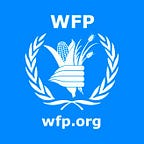Bringing relief to families in Rural Damascus
The World Food Programme finally reaches residents in the Syrian towns of Yalda, Babila and Beit Sahem after two years without access.
A long trek home
Um Ibrahim’s husband passed away of natural causes over a year ago leaving her as the sole caretaker of her son, mother, and mother-in-law. Um Ibrahim has to walk over an hour every day from her hometown of Babila to run errands in Damascus city as the price of basic supplies in the city have skyrocketed.
“The sight of this assistance fills me with such happiness and relief. For nearly a year, I felt we were forgotten. We received no attention and no help from any organization. Seeing you here now makes me hopeful again.”
Growing a friendship in Babila
Cousins and best friends, Adam and Ismail live in the town of Babila and do almost everything together from playing soccer and hide-and-seek to studying Math and Arabic during the school year. They coyly lingered near a United Nations warehouse curiously watching as some local volunteers in the town offloaded much-awaited food and humanitarian assistance for 35,000 Syrians from the towns of Babila, Yalda, and Beit Sahem. Access to these three towns, located in rural Damascus, had been impossible since 2015 due to insecurity. Residents in the town say they need regular humanitarian assistance on a monthly basis to fulfill their food and medicinal needs.
Longing for better days
Mohamed Sayegh, 50, looks on with sadness as local volunteers in the town of Yalda offload much-awaited food assistance for the town’s residents and displaced families being hosted there. While he is grateful for this assistance, the fact that it is necessary grieves him.
“I long for the day Syrians no longer need assistance or charity to live decently. Syrians are a very entrepreneurial and hardworking people. We love working and creating beautiful things for a living.”
Unemployment is a chronic problem inside Yalda and its two adjacent towns of Babila and Beit Sahem. The towns have entered reconciliation agreements but remain semi-besieged due to their proximity to nearby ISIS-held areas. Men like Mohamed, who is a welder by trade, face difficulty earning a living and providing for their families.
Fresh air and a daily walk
For Abu Jad, 60, running his daily errands is a good way to stretch his legs and get out of his hometown of Beit Sahem in rural Damascus. He tries to spend as much time as possible outside and says it is better than being trapped at home. Abu Jad’s oldest son left Syria with his wife and two children while his two daughters, Laila and Aisha, have remained home in Beit Sahem with their father, who still holds on to hope for a better future for all of them.
“God bless you for helping us. Life was easier in the past but now men can’t find jobs to provide for their families.”
With WFP food rations containing bulgar wheat, lentils, fava beans, vegetable oil, sugar and salt, the families of Yalda, Babila and Beit Sahem will be able to cook wholesome meals every day for one month.
